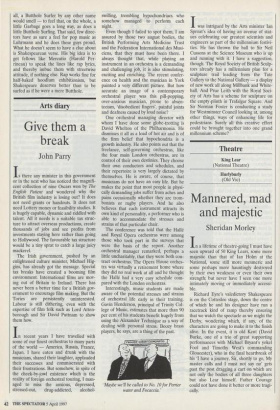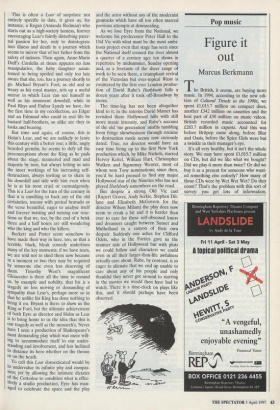Theatre
King Lear (National Theatre) Hurlyburly (Old Vic)
Mannered, mad and majestic
Sheridan Morley
In a lifetime of theatre-going I must have seen upward of 50 King Lears, some more majestic than that of Ian Holm at the National, some still more mesmeric and some perhaps more hauntingly destroyed by their own weakness or even their own strength; but never have I seen one more intimately moving or immediately accessi- ble.
Richard Eyre's valedictory Shakespeare is on the Cottesloe stage, down the centre of which he and his designer have run a racetrack kind of ramp thereby ensuring that we watch the spectacle as we might the Derby, wondering which, if any, of the characters are going to make it to the finish alive. In the event, it is old Kent (David Burke, one of a trio of great supporting performances with Michael Bryant's yokel Fool and Timothy West's commanding Gloucester), who in the final heartbreak of his 'I have a journey, Sir, shortly to go, My master calls and I must not say no' gets past the post dragging a cart on which are not only the bodies of all three daughters but also Lear himself. Father Courage could not have done it better or more tragi- cally. This is often a Lear of surprises: not entirely specific in date, it gives us, for instance, a Regan (Amanda Redman) who starts out as a high-society hostess, forever encouraging Lear's faintly disturbing pater- nal passion for her, only to disintegrate into illness and death in a journey which seems to mirror that of her father from the safety of indoors. Then again, Anne-Marie Duff's Cordelia at times appears no less manipulative, the baby daughter accus- tomed to being spoiled and only too late aware that she, too, has a journey shortly to go. Michael Bryant's Fool, as old and as weary as his royal master, sets up a useful mirror in which Lear can see himself as well as his imminent downfall, while in Paul Rhys and Finbar Lynch we have, for the first time in my recollection, an Edgar and an Edmund who could in real life be bastard half-brothers, so alike are they in looks and bearing.
But time and again, of course, this is Holm's Lear, and we are unlikely to leave this century with a better one; a little, angry bearded gremlin, he seems to defy all the preconceptions about the King as he pads about the stage, mannered and mad and majestic by turn, but always letting us into the inner workings of his increasing self- destruction, always inviting us to share in his downfall and side with him even when he is at his most cruel or curmudgeonly. This is a Lear for the turn of the century in that it is unwilling to back any of the old certainties, uneasy with period bravado or the verse beautiful, eager to analyse itself and forever twisting and turning our reac- tions so that we, too, by the end of a brisk three and a half hours are still wondering who the king and who the killers.
Beckett and Pinter seem somehow to have made their way in here, too, so that a terrible, black, bleak comedy underlines many of the key moments; if we have tears, we are told not to shed them now because in a moment or two they may be required by someone else even less deserving of them. Timothy West's magnificent Gloucester is there all the time to remind us, by example and nobility, that his is a tragedy no less moving or demanding of sympathy than Lear's, perhaps more so in that he unlike his King has done nothing to bring it on. Bryant is there to show us the King as Fool, but the ultimate achievement of both Eyre as director and Holm as Lear Is to bring home to us the idea that this is our tragedy as well as the monarch's. Never have I seen a production of Shakespeare's most demanding play which was more will- ing to accommodate itself to our under- standing and involvement, and less inclined to distance its hero whether on the throne or on the heath.
To call this Lear domesticated would be to undervalue its infinite pity and compas- sion; yet by allowing the intimate dictates Of the Cottesloe to condition what is effec- tively a studio production, Eyre has man- aged to celebrate the space and the play and the actor without any of the modernist gimmicks which have all too often marred previous attempts at downscaling.
As we lose Eyre from the National, we welcome his predecessor Peter Hall to the Old Vic with what must be the most ambi- tious project even that stage has seen since the National itself crossed the river almost a quarter of a century ago: ten shows in repertoire by midsummer, Sunday opening and, as a foretaste of the sheer range of work to be seen there, a triumphant revival of the Victorian but ever-topical Waste is countered by the first ever London produc- tion of David Rabe's Hurlyburly fully a dozen years after it took off-Broadway by storm.
The time-lag has not been altogether kind to it; in the interim David Mamet has revisited these Hollywood hills with still more manic intensity, and Rabe's account of the old 'me generation' misfits tumbling from fringe showbusiness through cocaine to destruction mode seems now curiously dated. True, no director would have an easy time living up to the first New York production which, by Mike Nichols, starred Hervey Keitel, William Hurt, Christopher Walken and Sigoumey Weaver, most of whom won Tony nominations; since then, you'd be hard pressed to find any major Hollywood star of the Nineties who has not played Hurlyburly somewhere on the road.
But despite a strong Old Vic cast (Rupert Graves, Andy Serkie, Stephen Dil- lane and Elizabeth McGovern for the director Wilson Milam) the play does now seem to creak a bit and it is harder than ever to care for these self-obsessed losers and dreamers caught between Sunset and Mulholland in a canyon of their own despair. Suddenly one aches for Clifford Odets, who in the Forties gave us the seamier side of Hollywood but with plots we could follow and characters we could even in all their larger-than-life awfulness actually care about. Rabe, by contrast, is so eager to alienate that we end up unable to care about any of his people and only thankful they never got around to starring in the movies we would then have had to watch. There is a time-clock on plays like this, and it should perhaps have been observed.



























































 Previous page
Previous page